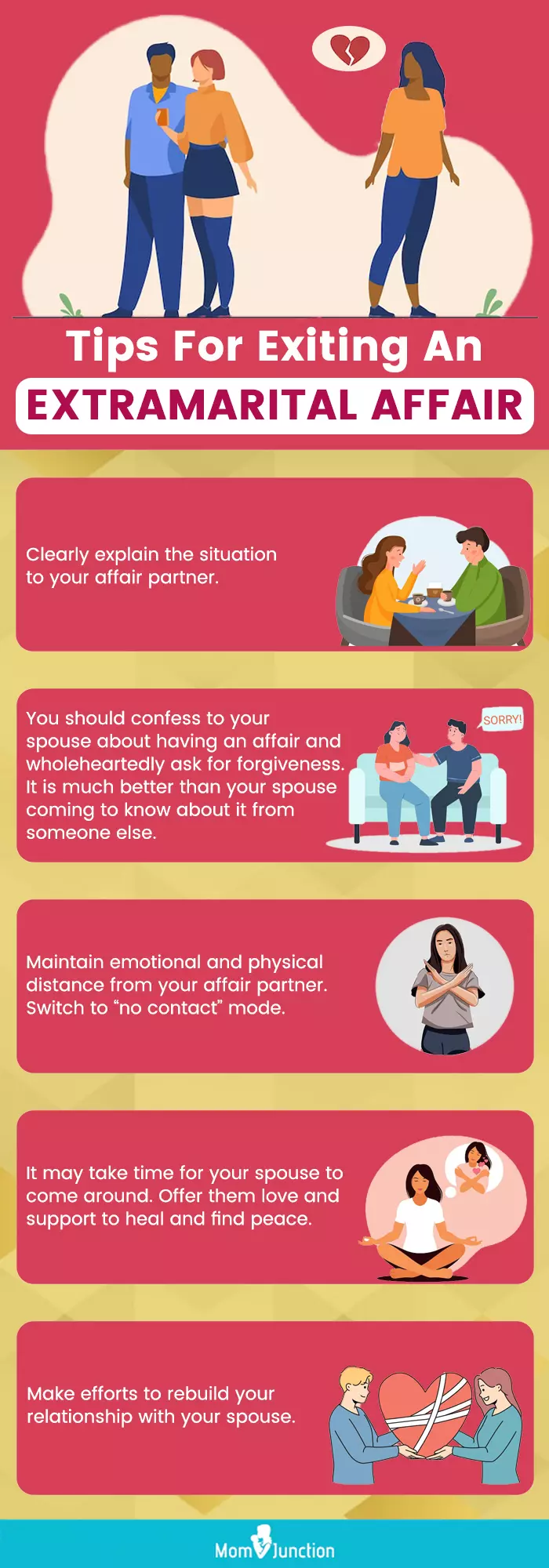
Image: iStock
Extramarital affairs can ruin families and relationships. Unlike romance, these affairs, at least the majority of them, start as casual ones or flings but end up doing irreversible damage to both the involved partners, their spouses, and also their children. While some of these affairs may last weeks, some might last months, and others may continue for years. Why is it that some affairs are just a flash in the pan, but others last long? What are the contributing factors? Why do some affairs last for years? Delve into our post to know the reasons.
Key Pointers
- An inclination to polyamory and the need to escape the monotony of marriage are common reasons for long-lasting affairs.
- It can be difficult to end an affair if two people fall in love or are addicted to each other.
- Issues such as sexual incompatibility with the partner or narcissistic or abusive behaviors can also make one stay in an affair for longer.
Why Do Some Affairs Last For Years: 12 Reasons
To understand why some affairs last longer than usual, it is important to understand the emotional factors associated with it. Some may carry on because of unmet emotional needs, while others may carry on due to the thrill of secrecy, at the expense of their primary commitments. Read on to discover more reasons why such illicit affairs persist.
1. Natural inclination for polyamory
Some people are inherently inclined to have multiple sexual partners
. Their affinity to be polyamorous has nothing to do with their spouse’s behavior in marriage or other background. They have flings, which sometimes turn into affairs owing to the joy of indulging in physical relationship with multiple partners.
2. Escape from the monotony of marriage

Image: Shutterstock
Most people who have extramarital affairs consider marriage to be banal and boring. They look for other partners because they lack patience and seek excitement in newer things, and to this end, they seek new partners to fulfill their needs, common interests and desires.
3. Getting back at partner
Some married people don’t have compatibility, appreciation or commitment with their partner, be it physical, emotional, or mental, which gradually leads to resentment and hatred towards their spouse. This spite could turn into frustration, and they end up having affairs with the goal of getting even with their partner.
4. Partner is a narcissist
Dealing with a narcissistic husband or wife can be taxing both emotionally and mentally. Sometimes
, to escape the apathy and unrequited love of their partner, people start having affairs. They seek love, dedication, affection, and contentment that they lack in life in these relationships.
5. Societal compulsions
Some of the married people who get into affairs after marriage are usually the ones who are forced to cohabit with their partners owing to peer acceptance and societal pressures. They avoid that extreme step of divorce and have an affair to seek love and solace outside of marriage due to lack of love and proper communication.
 Did you know?
Did you know?6. Casual affairs turn into love

Image: Shutterstock
Without the two people involved in the affair realizing, sometimes casual affairs transform into serious relationships. They go to the extent of completely ignoring their spouses and start investing their entire time, money, and similar values of marital emotions with their paramours.
7. Affairs become an addiction
Though the affair might be fun and exciting for the two people involved, at the outset, spending long periods together can insidiously turn into an unnatural admiration due to uninhibited openness. This addiction can be physical and emotional attraction, and both may find it extremely difficult to live without the other.
 Quick fact
Quick fact8. Sexual or emotional incompatibility with spouse
Lack of physical intimacy, care and emotional compatibility with your spouse also plays a key role in extramarital relationships running for years on end. Once you strike a chord with your lover with respect to physical intimacy or emotional connection, the sacrifice of the newly found physical affair and going back to your spouse decreases.
9. Abusive partner

Image: Shutterstock
When you are living with a partner who abuses you verbally, physically, mentally, and psychologically, the easiest escape route is an affair. Of course, leaving them for good is the ideal solution, but people tend to feel that seeking solace in a new partner gives them relief as they are warmed by their sympathy.
10. Fear of loneliness
The fear of loneliness can strongly drive individuals to engage in long-term affairs. The lack of emotional support and companionship might lead them to continue with the affair, even if they recognize its harmful impact on their primary relationship. In such cases, avoiding loneliness becomes a priority over addressing issues in their existing marriage or partnership.
11. Low self-esteem
For some, knowing they are desired by someone else can significantly boost their self-esteem and sense of self-worth. If an individual is insecure within their marriage, they may be more inclined to seek validation outside of it. Even if their partner is loyal and caring, feelings of insecurity may make them believe their partner’s affection is obligatory. On the contrary, receiving admiration from someone new can feel exciting, contributing to the longevity of the affair.
 Point to consider
Point to consider12. Fantasy and idealization
Some people in long-term affairs look at their partners with rose-tinted glasses, focusing on their positives and putting them on a pedestal while ignoring their flaws. They are blinded by the novelty and excitement this relationship brings, often to the detriment of their primary commitment. On the other hand, they only focus on the flaws of their primary partner while ignoring all their positives. This fantasy leads them to prolong their affair as an escape from the reality of their primary relationship.
Consequences Of Long-Term Affairs
Long-term affairs can have several detrimental effects on a person’s life and relationships. Here are the ones they should watch out for:
- Emotional distress and instability
- Strain on family dynamics on both ends
- Potential lasting damage to the primary relationship
- Immense damage to self-esteem
- Attachment trauma or fear of future attachments
- Anxiety and trust issues
- Long-lasting feelings of guilt
- Fear of betrayal in future relationships
- Depression, anxiety, and associated illnesses in the kids involved
Frequently Asked Questions
1. Why are affairs so hard to end?
Any deep bond filled with priceless memories is hard to break apart. An affair is hard to end because you may have created an emotional, spiritual understanding, mutual trust and sexual bond with this person. Moreover, this person may seem to know you well and fill some deep need or void in your life. Separation can also get hard when you feel guilty and worry about hurting your partner.
2. Can affairs lead to true love?
Yes, they can. The passion and physical intimacy may fade over time. However, when both parties become their support system as they display empathy, have similar shared goals and fill the void in each other’s life, the affair may transform into true love.
3. How does secrecy affect affairs that last for years?
Secrecy maintains the affair’s confidentiality from an individual’s partner, family, friends, and colleagues. It can also create heightened intimacy between the involved parties. They evolve into close confidants, relying on each other for emotional support and understanding.
4. What are some signs that an affair that has lasted for years is starting to end?
If one or both parties involved in the affair begin to experience physical and emotional withdrawal, it could signify the relationship losing its intensity. Furthermore, if the affair begins to cause significant strain on the individuals’ personal lives, it can lead to increased conflict and tension. These conflicts may contribute to the decision to end the affair.
5. Can therapy or counseling help individuals in affairs that have lasted for years?
Yes, therapy (including couples therapy) or counseling can help individuals involved in long-term affairs. Experienced therapists or counselors can offer support and guidance and create a safe space to address the complex emotions and dynamics surrounding infidelity.
An anonymous married mother from Australia describes her experience of how she and her husband needed to work together following her discovery of his affair. She says, “Back around the middle of the year, I was convinced my marriage was over. We lived separate lives, just under the same roof. But I hung around. I had three young children to think about. We’ve done the work. We’ve gone through couple’s therapy. We’ve had many talks. He owned his mistakes (i).”
6. How do long-term affairs typically end?
Many long-term affairs end because both partners feel guilty for carrying on the affair for too long. Other reasons can include changing feelings for each other or external pressures from their primary partners or family. The primary couples can also go for couples counseling to understand why the affair began in the first place, tackling which can end the affair.
There are various factors that influence the longevity of affairs. The ideal thing to do to avoid cheating in a marriage is to talk it out when issues prop up and resolve them amicably. While having an affair and cheating on your spouse may give instant gratification and seem like a temporary solution, in the long run, it stands against the principles of loyalty and trust, which are some of the most important things in a relationship. The consequences of an affair can be detrimental to your spouse, partner, and family.
Infographic: Is It Possible To Come Out Of An Affair?
Sometimes we fail to understand what we want and may get involved in an extramarital affair. With time, it may seem futile to trade your family for someone else, and you wish you could undo some past events. Though it may not be easy to end an affair and continue happily in your married life, it isn’t impossible either. Check out the infographic below for some pro tips. Illustration: Momjunction Design Team
Illustration: Reasons Why Some Affairs Last For Years

Image: Stable Diffusion/MomJunction Design Team
Discover the surprising reasons why some affairs can last for a long time. Gain insights into the complexities of these relationships and understand what keeps them going.
Personal Experience: Source
MomJunction articles include first-hand experiences to provide you with better insights through real-life narratives. Here are the sources of personal accounts referenced in this article.
i. It’s now four years later and I’m OK;https://shatteredbyaffair.wordpress.com/2017/12/
References
- Who Cheats More? The Demographics of Infidelity in America;
https://ifstudies.org/blog/who-cheats-more-the-demographics-of-cheating-in-america - Higher testosterone levels are associated with unfaithful behavior in men;
https://pubmed.ncbi.nlm.nih.gov/31326436/
Community Experiences
Join the conversation and become a part of our nurturing community! Share your stories, experiences, and insights to connect with fellow parents.
Read full bio of Jessica Jefferson
Read full bio of Siddharth Kesiraju
Read full bio of Shikha Thakur
Read full bio of Ratika Pai























